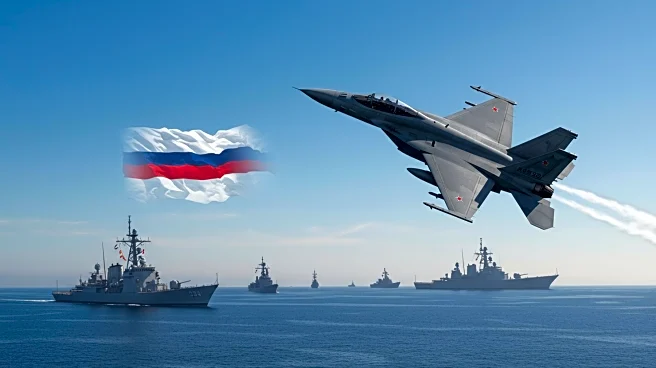What is the story about?
What's Happening?
Australia has initiated its largest military exercises with the Philippines, involving over 3,600 military personnel in live-fire drills, battle maneuvers, and a beach assault at a Philippine town facing the disputed South China Sea. The exercises, named Alon, will showcase Australia's military capabilities, including a guided-missile navy destroyer, F/A-18 fighter jets, a C-130 aircraft, Javelin anti-tank weapons, and special forces sniper weapons. Observers from the United States, Canada, Japan, South Korea, New Zealand, and Indonesia will be present. Vice Adm. Justin Jones of the Royal Australian Navy emphasized the importance of maintaining regional sovereignty and international law. The drills are set to continue until August 29.
Why It's Important?
The military exercises underscore the strategic alliances and defense cooperation between Australia and the Philippines, particularly in the context of rising tensions in the South China Sea. China's assertive actions in the region have prompted concerns among neighboring countries and their allies. The drills serve as a demonstration of military readiness and a commitment to regional security, potentially influencing geopolitical dynamics. The involvement of multiple countries as observers highlights the international interest in maintaining stability and freedom of navigation in the South China Sea, a crucial global trade route.
What's Next?
The Philippines is expanding its defense partnerships, having signed a visiting forces agreement with Japan and engaging in talks with other countries like France and Canada. These developments may lead to increased military presence and cooperation in the region. China's reaction to these exercises and alliances could further escalate tensions, prompting diplomatic and military responses from involved nations. The ongoing territorial disputes in the South China Sea remain a critical issue, with potential implications for international trade and regional security.
Beyond the Headlines
The exercises reflect broader geopolitical shifts, with countries in the Indo-Pacific region seeking to balance China's influence through strategic partnerships. The emphasis on international law and sovereignty highlights the legal and ethical dimensions of territorial claims and military activities. Long-term, these developments could lead to a reconfiguration of alliances and defense strategies in the region, impacting global power dynamics.

















